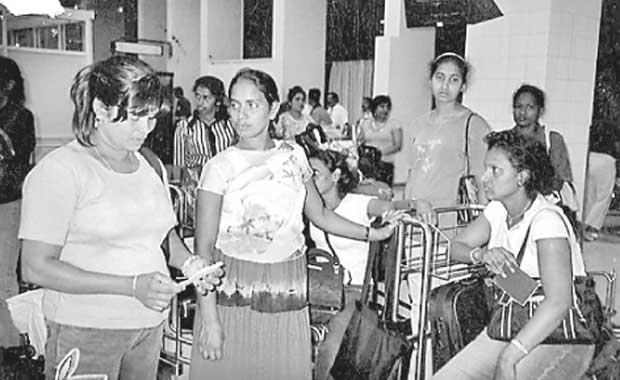Reply To:
Name - Reply Comment
Last Updated : 2024-04-24 11:56:00

In an earlier article, I pointed out that there was an urgent need to increase productivity of labour and value added production, in order to arrest the present downward slide of the economy and with it, society and polity. This has become all the more necessary because, unlike in the past, today, most people do not want to live frugal and simple lives.
There are about three million motor cycles in the country, in addition to over a million three-wheelers. Urban roads are full of all types of motor cars. All this is for just twenty million people in the country, which is by no means a developed one. None of these vehicles are produced here. We are just consumers of all sorts of transport machinery.
Political leaders have no shame. They talk about protocol in allocating different brands of vehicles among VIPs, but never mention about the need to deploy unproductive labour for productive activities. They are perhaps happy, that people are leaving the country in droves to work overseas and send remittances that can be used to import what they and others want.
In this article, I wish to highlight the tendency among a large part of the population to become rent seekers, without contributing much to production or productivity.
While it is true that people in many modern societies have become more productive due to technological advancement and other social innovations, more and more people many countries want to take an increasing share of the national wealth irrespective of whether they contribute to wealth creation or not.
Most of these people are rent seekers who use their knowledge, power and influence to serve themselves. For instance, in Sri Lanka, members of an expanding political class ranging from local level political activists to regional and national level leaders thrive essentially on various material privileges they enjoy at public expense. As is well known, members of the Government have come under increasing pressure in recent years to appoint a majority of ruling party MPs as Cabinet and other Ministers, resulting in top heavy Governments that absorb a large part of the public finances for their own sustenance.
When the economy was liberalised, the number of public sector employees came down substantially, from about 1.2 million to about 800,000. But, the previous regime, almost entirely for opportunistic political reasons increased the number again, this time to about 1.5 million.
Many of these workers contribute little to economic productivity but enjoy all kinds of privileges that the toiling masses cannot even imagine. They naturally contribute to the demand for various goods and services and in turn to increasing inflation in the country.
On the other hand, the private corporate sector has not been any better in the above regard. The salaries and other privileges higher executives of the corporate sector enjoy have little correspondence to the incomes of the masses, including their own lower ranking employees. This is the same syndrome that the whole world is talking about, namely, 1 percent of the population controlling unprecedented wealth while 99 percent struggling to meet their basic needs such as food, medicine and shelter.
While there are some innovative entrepreneurs and productive industrialists in many countries, even in the developing world, more and more people today turn to financial business, both licit and illicit, and all kinds of dubious services in order to make money. Most of these activities amount to rent seeking.
These days we hear a lot about tax heavens, money laundering and offshore businesses. Then, there is corruption of all forms. Those who control public resources are well placed to seek a bribe or a commission to dispense such goods that include places in good government schools, government contracts, building and business permits, public sector jobs and even foreign employment  opportunities.
opportunities.
Many professional services are not well regulated. As a result, professional service providers can often charge fees from hapless clients in an arbitrary manner. While clients are often exploited, large sums of money accumulated and used for consumption purposes by professionals contribute to inflationary pressure.
The resultant increase in the prices of consumer goods and various services make life unbearable for people engaged in rural agriculture and cottage industries.
As is well known, many youths leave the villages in favour of urban services such as transport and trade. This naturally undermines productive rural activities such as agriculture. Contented village life is a thing of the past.
It is true that labour has increasingly shifted towards service sector activities in many countries over time. But this has been made possible by increasing labour productivity due to the application of new knowledge in the production process. But what we observe in Sri Lanka is nothing of the sort. Here, people have moved away from productive activities due to increasing economic pressure, resulting in a significant decline in economic production. This has made our situation worse because we have become more and more dependent on imports.
Increasing division of labour and specialisation are essential characteristics of modern societies. So, theoretically, almost everyone is a potential contributor to development and public welfare. But, the actual contribution of various social, economic and political actors depends on how their activities are socially regulated. Various professional specialists have a distinct contribution to make but what they receive in return for their work has to be in keeping with what society can afford to pay without creating undue disparities across social strata. The same is true for political actors. While they need to be adequately compensated for their important role in the management of public affairs, their privileges cannot be outrageously out of tune with the wealth of a nation.
But, this is exactly what has happened in this country over the years. While the country is heavily indebted to the rest of the world, and more foreign debts have to be secured to service the accumulated debts, the members of the political elites want the most expensive cars for their day to day use, each costing as much as 50 million rupees.
Their use of public funds for other services such as telephones, housing and overseas travel is often equally scandalous. While it is highly doubtful that such compensation at public expense is commensurate with their actual contribution to public welfare, in any case, the country can ill afford such extravagant expenditure at its present level of development.
The lack of careful social regulation of the redistribution of the country’s wealth among its various constituent groups and strata has resulted in unprecedented inequalities and injustices. As a result, we have not been able to rationally allocate the country’s human resources both spatially and across sectors.
Many people are running around looking for income opportunities and as a result, the lives of more and more people are increasingly disorganised.
Many of the basic services are organised and delivered in an extremely exploitative fashion, be it health, education, Justice, human security, or even public health. Ordinary people increasingly feel that society around them is not just and the elites have become rent seekers, do everything to exploit them and enjoy life.
They become agitated with the slightest provocation and consequently maintenance of public order is becoming increasingly more difficult.
Against the above background, it is timely that we commence a new public discourse on how to rationalise income distribution and socially regulate the activities of institutions and groups in order to minimise rent seeking and create equal opportunities for all segments of society. In the context of such a social contract, tax evasion, money laundering, manipulation of currency, real estate and commodity markets, bribery and corruption, exploitation of labour devoid of social protection, unregulated earnings of professionals, etc. should not be tolerated.

Add comment
Comments will be edited (grammar, spelling and slang) and authorized at the discretion of Daily Mirror online. The website also has the right not to publish selected comments.
Reply To:
Name - Reply Comment
US authorities are currently reviewing the manifest of every cargo aboard MV
On March 26, a couple arriving from Thailand was arrested with 88 live animal
According to villagers from Naula-Moragolla out of 105 families 80 can afford
Is the situation in Sri Lanka so grim that locals harbour hope that they coul